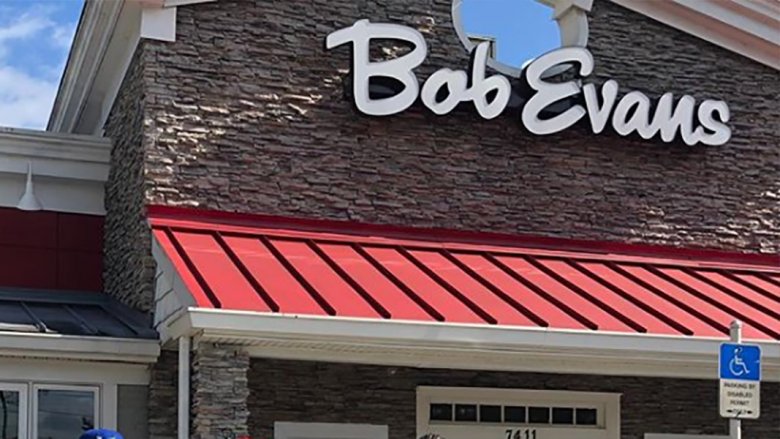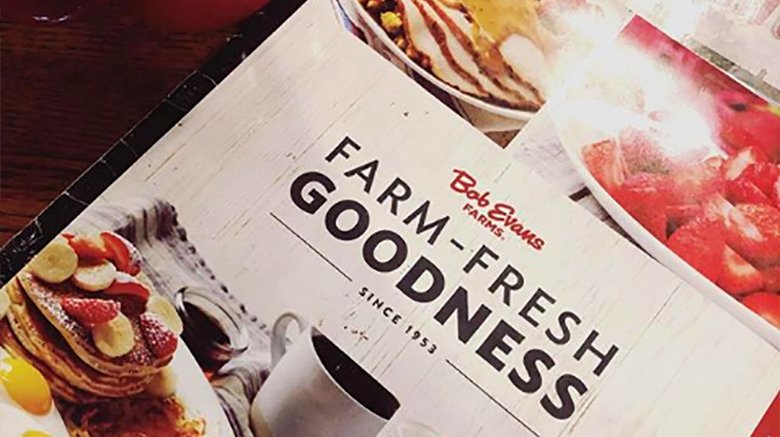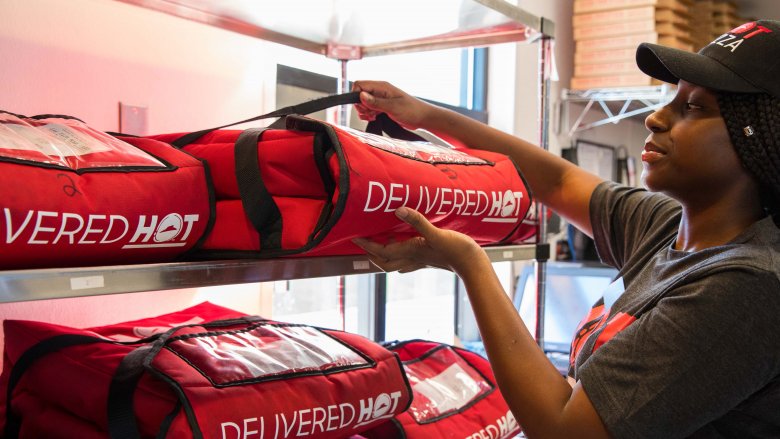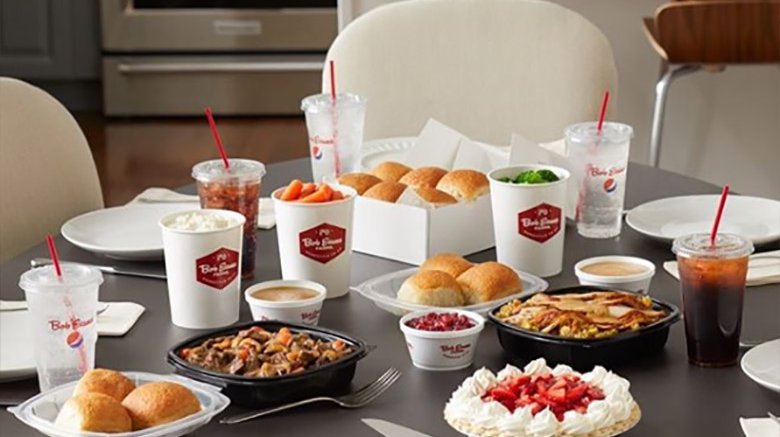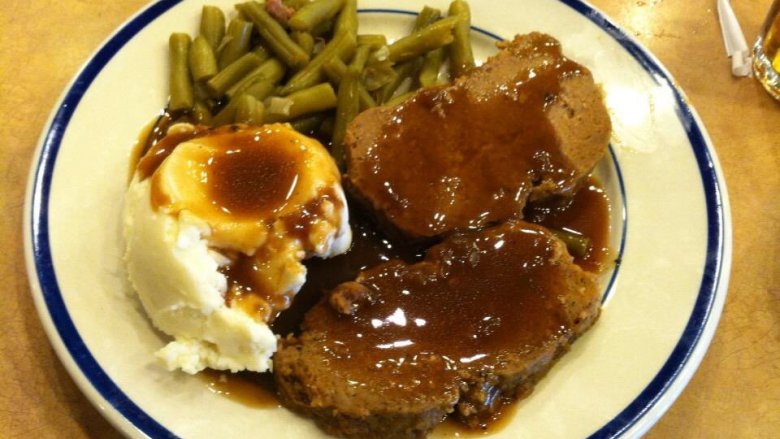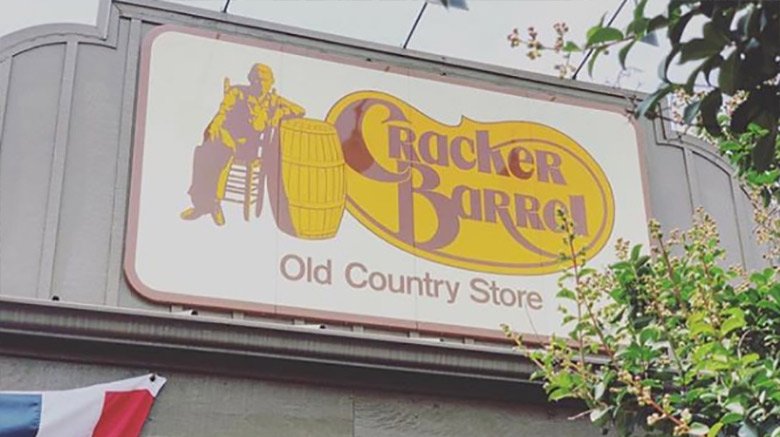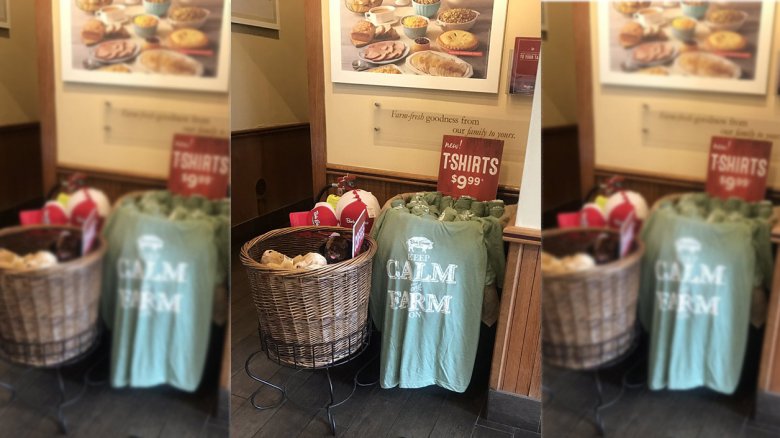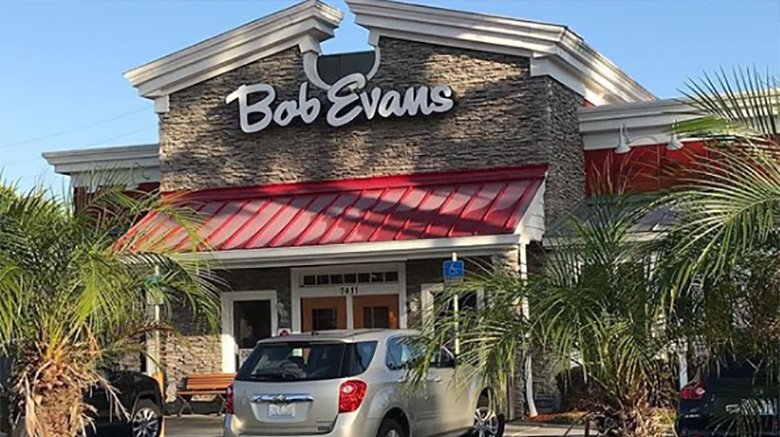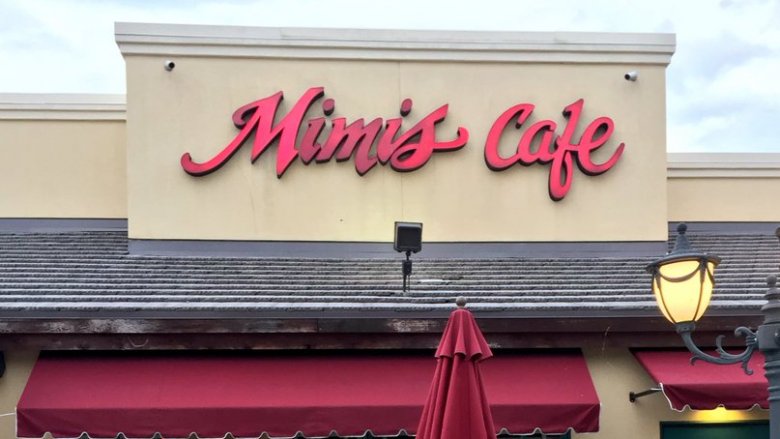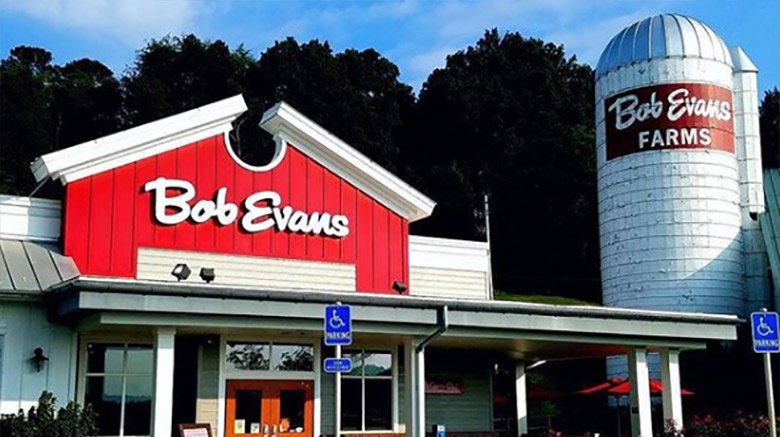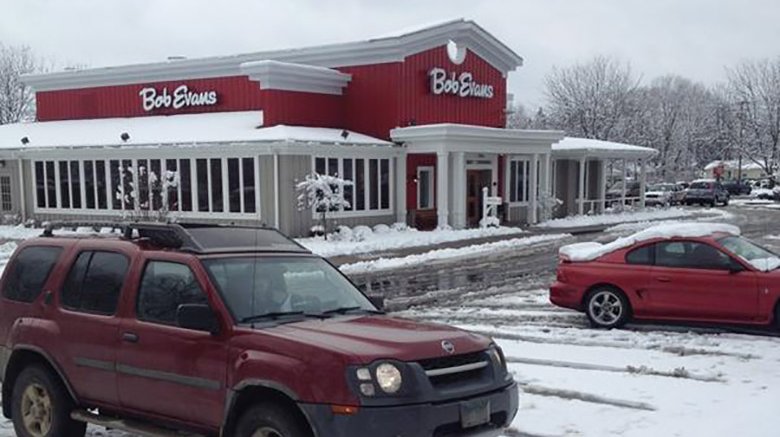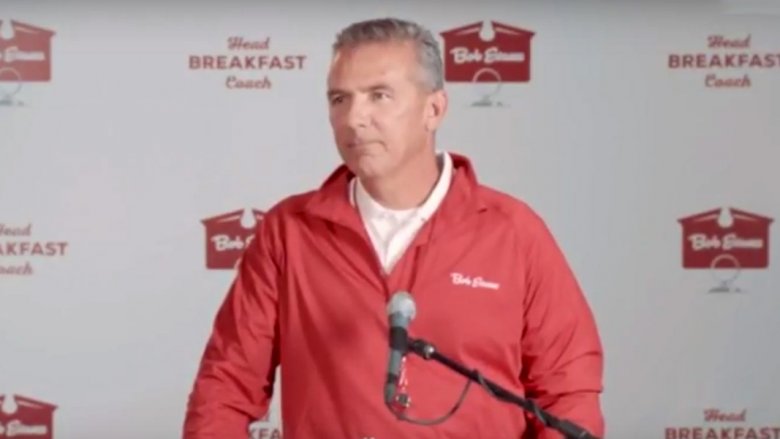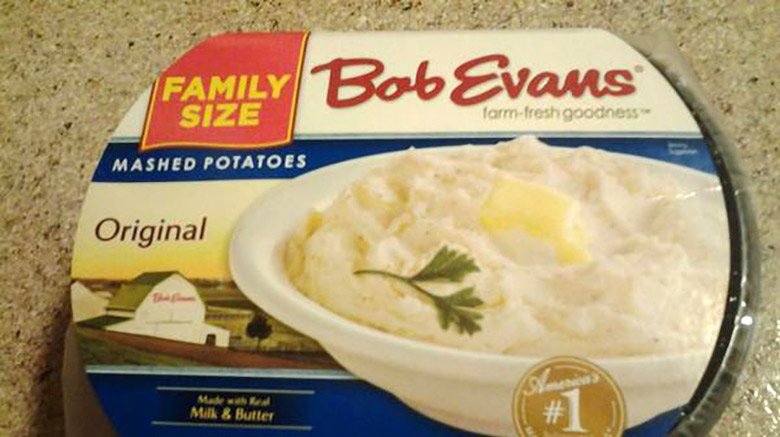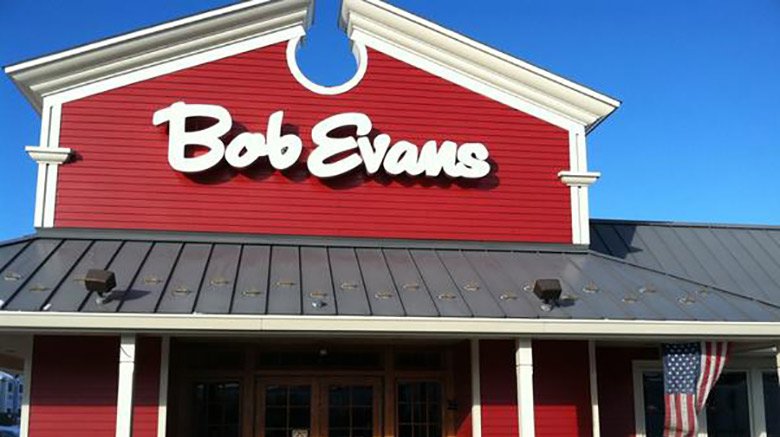The Real Reason Why Bob Evans Is Disappearing Across The Country
If you find yourself driving through Ohio, you probably won't have to search too long before you see a Bob Evans restaurant. The family-style restaurants that bare the name of their founder, first opened in Rio Grande, Ohio in the 1960s. From there, they grew throughout the Midwest and South, spreading fried chicken and mashed potatoes throughout the heartland. Times were good.
All has not been well though in recent years for this American dining-chain. It's been plagued by everything from bad business deals to changes in American dining habits. Even mother nature has thrown a monkey wrench into its operations and the result has been declining sales and numerous restaurant closures. While you can still find its popular side dishes in grocery stores, the days could be numbered for the Bob Evans restaurants. Here are all the reasons why your local Bob Evans restaurant may now — or soon — have a "vacancy" sign in the window.
The menu had become bloated
A well-crafted menu is crucial for a restaurant's success and if it's too large it can be overwhelming to the customer. The Cheesecake Factory may be able to get away with this, but they're something of an anomaly in the chain restaurant game.
"We did some consumer research, and we found that our menu was a little bit overwhelming to people," Bob Evans' chief marketing officer Sara Bittorf said in 2016. Bittorf added that the menu was simply treating all items too "equally" and that this democratic approach was hurting the menu's real food stars. "We wanted to create a menu that really allowed people to see and find the great products that we're known for [and that] will leave them highly satisfied."
While then-president John Fisher did say that ditching 20 items proved to be a popular move with the restaurant's servers, some customers weren't feeling it. Still, the chain continued to experiment with their menu and occasionally dropped popular items for the next few years.
"I just learned that Bob Evans has discontinued serving blueberry & strawberry crepes as part of their breakfast menu," one patron wrote on Pissed Consumer. "These were the best items on the menu." Blueberry crepes made a quick return after that disappearance, but if strawberry is your thing, well, depending on your location... sorry.
They tried to compete with the pizza delivery market
A few years before Bob Evans put all its eggs in the takeout basket, the company tried to take a slice — pun very intended — out of the pizza delivery market with Family Meals To Go. The company launched the campaign in 2010 with the tagline "think outside the pizza box" and even offered a discount to customers who cheated on their favorite pizza chain and brought in pizza coupons.
The campaign was targeted more at working moms than college students and each meal included some sort of entree with sides and bread for a little less than $20. While $20 certainly wasn't bad when it came to buying a family meal, it also wasn't as cheap as pizza and in 2010 the pizza market still had the upper hand when it came to delivery. Even today, with delivery options like DoorDash and Grubhub, the pizza market is still its own beast in the world of delivery/takeout and Bob Evans never stood a chance as the years ahead took its sales on a downward trend.
Takeout didn't solve their dine-in woes
It's no secret that takeout and now delivery has had a huge impact on how people buy food from restaurants. The change has been so radical that some restaurants are actually scaling down the space for dine-in customers, simply because there aren't enough walking through the door. Bob Evans is no different in that they've seen their dine-in numbers decline over the years, and as a result, they've tried to offset the slide by placing more emphasis on takeout.
In 2014, the chain started to ramp up takeout efforts and the move appeared to be smooth as gravy. Nations Restaurant News reported that in the first year, same-store sales rose 22.6 percent in the takeout category. It seemed like Bob Evans had found the golden ticket to offset a 1.5-percent decline in on-premise same-store sales. Alas, the takeout boom didn't prove quite strong enough down the road to offset the number of empty booths. Dine-in same-store sales continued to slip by 3.4 percent and while takeout was up 25 percent it's likely that the takeout orders where cannibalizing what could have been dine-in sales. Dine-in checks tend to be a few dollars higher than takeout checks and the result was an overall drop in sales and profits for Bob Evans.
Food poisoning scandals hurt their image
How bad is the meatloaf at Bob Evans? It's so bad that it just might kill you... at least that's what a lawsuit claimed. Meatloaf is one of those down-home staples that's a must-have for a restaurant that prides itself on comfort food such as Bob Evans. When that meatloaf is involved in a food poisoning lawsuit that alleges it resulted in the death of two people, well, folks might not be so inclined to order it.
According to the complaint, Harold and Virginia Starcher ate the meatloaf at a Bob Evans restaurant in West Virginia in 2012 and nine hours later were violently ill and in the emergency room. The children who filed the lawsuit claim that both parents were then moved into a rehabilitation center and neither ever fully recovered from the food poisoning. Within a couple of months, both Harold and Virginia were dead.
The case moved on to federal court in 2014. While it's unclear if the case was dismissed or it was settled for an undisclosed amount related to the more than $250,000 the children were seeking, it's not the sort of publicity that gets people fired up about "Meatloaf Mondays."
Cracker Barrel is kicking their butt
Let's say, you're on a road trip, the kids are hungry, and there's a Bob Evans on one side of the road and a Cracker Barrel on the other. Which place are you hitting up for country cookin'? Well, if you're like the majority of Americans, the answer is probably Cracker Barrel.
Cracker Barrel reported some pretty healthy growth in 2018 with an increase in both in-store restaurant sales and in-store retail sales. Poor Bob Evans though just continued its yearly sales decline. Cracker Barrel also continued its westward expansion by breaking into the California market. Meanwhile, Bob Evans was busy closing multiple locations.
So in terms of growth and sales, Cracker Barrel seems to be winning over Bob Evans, but what about the overall taste of the food? Well, if you ask Twitter, it seems like Cracker Barrel has a slight edge over Bob Evans, yet again. "Bob Evans is Cracker Barrel's ugly younger brother," said one person. "Cracker Barrel. Why is Bob Evans even in the equation?" added another person. Your move, Bob Evans.
Incorporating retail into the restaurants wasn't a lifesaver
One of the things that Cracker Barrel has done well is to persuade its customers to spend a little more either before or after their meal in its retail shops. They're "old country store" has been around for decades, but it wasn't until 2010 that Bob Evans tried a similar idea.
The chain didn't go all out and start selling quilts, but they did bring a "farm-style menu and aesthetic" to their restaurants with what they called "Taste of the Farm." The idea was to sell quick-grab items so that people could take a piece of Bob Evans home with them. Things like t-shirts, baking mixes, jellies, syrups, etc.
"We realize that the way people eat these days is not just by going to sit down in your restaurant," director of communications Margaret Standing said at the time. "They want your brand to be reaching out and touching them in different ways."
How much customers actually wanted the Bob Evans brand to "reach out and touch them" is debatable. Despite the company calling the concept a hit at the time with their trial store, they continued to grapple with restaurant sales drops in 2010 and beyond.
Store remodeling efforts yielded little change
It's not uncommon for chain restaurants to remodel their image every few years in the hopes of bringing customers in to check out the new digs. Taste of the Farm was just a preview of things to come for Bob Evans and in 2012 they really kicked things into high gear, launching what they called a "Farm-Fresh Refresh" remodeling program of restaurants throughout the Midwest. Besides the standard new paint job, seating, and lighting fixtures, the restaurants were installed with a dedicated takeout section and bakery counter. Ooh, fancy! In total, this remodeling eventually spread throughout all 561 Bob Evans restaurants — but was it worth it?
In 2012, then-company CEO Steve Davis said that the remodeled stores were showing good performance, however, that didn't exactly hold steady in the long run. New paint and a bakery counter can only carry a restaurant so far and according to Forbes, the $225,000 spent per store only added to the company's growing debt while its same-store sales overall declined in 2014.
Mimi's Cafe was holding them back
It might seem a little odd for a restaurant chain known for pot roast and fried chicken to bring a French restaurant into the fold. Nevertheless, French-inspired casual-dining restaurant Mimi's Cafe was acquired by Bob Evans in 2004, but not even a decade later Bob Evans was looking to ditch it.
Sales were on a sharp decline at Mimi's in 2011 and despite recruiting a former executive from the Cheesecake Factory, things didn't turnaround for Mimi's. What's perhaps especially telling as to just how badly Bob Evans wanted to wash its hands of Mimi's Cafe is what it sold the 145-unit restaurant chain for. When Mimi's was sold in early 2013, it hadn't seen an increase in same-store sales since 2005, just a year after its purchase by Bob Evans!
Leading up to its sale, some industry insiders estimated that the chain would sell for $200 million. Nope. When Bob Evans finally unloaded its French anchor to LeDuff America, it did so for a price tag of just $50 million. That's gotta sting considering that when Bob Evans purchased Mimi's in 2004 it paid $182 million. Oof!
They've had to deal with several lawsuits
Restaurant lawsuits that involve the food, the staff, and the company's investors themselves are never good for business or public image — and Bob Evans has had all three. We touched earlier on the food aspect, but Bob Evans has also been accused of improperly tipping its servers.
In 2018, a group of employees filed a collective action suit alleging that Bob Evans incorrectly paid them tipped minimum wage, despite performing non-tipped work duties half the time they were at work. Basically, the employees claimed that they should have been paid the federal minimum wage of $7.25 an hour since they spent more than 20 percent of their time performing non-tipped duties. An Ohio federal judge approved the settlement and Bob Evans had to fork over $3,000,000 to some 1,800 employees.
Four years earlier, Bob Evans was sued by its second shareholder claiming that its board of directors stripped shareholders of the ability to change bylaws with a 51 percent majority vote. For investors who had a significant portion of Bob Evans shares, its easy to see how having the rug pulled out from them by a company struggling to keep its head above water would be concerning.
Bad winter weather of 2014 hurt sales
Using bad weather as an excuse for poor restaurant performance might sound about as flimsy as "the dog ate my homework" but a nasty winter really can put a business in the red. The executives at Bob Evans will likely speak of the "great winter of 2014" with a chilly reverence for years to come as it had a significant impact on the company's performance. The National Oceanic and Atmospheric Administration cited the winter of 2013-2014 as being one of the coldest on record for the Midwest and that translated to a restaurant sales drop between $3 million and $3.5 million for Bob Evans.
Not only does a blizzard or extreme cold make it less likely for customers to come flooding in through a restaurant's doors, but it also makes it difficult for the staff. If managers or servers can't make it to work, it results in a trickle-down on a restaurant chain's growth. According to the National Restaurant Association (via Washington Hospitality Association), 90 percent of restaurant operators said that changes in local weather conditions have a direct effect on sales numbers.
It doesn't matter how good the turkey and stuffing is, people just don't want to leave the house when it's negative 10 outside. And a loss like Bob Evans had that winter is hard to come back from.
An endorsement deal turned into a PR nightmare
Sometimes businesses can get stuck with a case of the bad timing blues and Bob Evans felt this firsthand when it looked to bring on a new spokesperson. In July 2018, it was announced that the restaurant chain had tapped Ohio Buckeyes football coach Urban Meyer as its "Head Breakfast Coach."
A press release at the time read that Meyer "embodies the same values the family dining restaurant was founded on — a down-to-earth, generous and hardworking way of life that is 'The Ohio Way'." *gulp*
Apparently, Bob Evans and Meyer weren't on the same page when it came to those "family values" because mere days later the deal was off. In early August 2018, Meyer came under fire for his alleged mishandling of a domestic abuse situation involving a member of his coaching staff.
While it certainly didn't have the sort of fallout of some scandals, it also wasn't the sort of publicity Bob Evans wanted with boosting their breakfast. In fact, upon Bob Evans announcing its partnership end with Meyer via Twitter, many Buckeye loyalists chimed in to say they would be taking their breakfast business elsewhere.
They're having more success in grocery stores
Bob Evans has had some of its most popular side dishes in grocery stores since the early 1990s. While Bob Evans retail foods division is now completely separate from its restaurants, they did start out under the same roof. The whole concept according to former marketing vice president Dee Hadley, was finding a way to offer convenience to working parents while giving them a better option than fast food. It was a huge success... maybe a little too successful even. As the retail sector grew, the restaurant side suffered and focus shifted in the company to its most profitable section.
According to The Columbus Dispatch, the grocery foods section of Bob Evans earned $9.8 million through sales of $112 million during the third-quarter of 2016. As for the restaurants, well, it wasn't quite so rosy and while they had sales of $223 million, they actually lost $1.6 million. People simply seemed to dig Bob Evans' mashed potatoes more when they were in their grocery cart, rather than eating them in an actual Bob Evans restaurant.
As a result of this, Bob Evans poured $20 million into expanding its production plant in Lima, Ohio, all while its restaurants sales struggled to make a profit.
The restaurants were sold to another company
In April of 2017, the parent company of Bob Evans restaurants, Bob Evans Farms,announced that it would be selling the restaurant portion of their business to Golden Gate Capital. The company had been struggling with debt for years and was getting pummeled by its competitors. By mid-2016, it's profits had fallen 90 percent and the company was struggling to keep up with the rising costs of doing business.
CEO Saed Mohseni said that the restaurants had simply become too much of a hassle for the company and with its packaged foods business growing, ditching the restaurant weight was the best option. "The sale of Bob Evans Restaurants allows the company to concentrate on Bob Evans Foods, the fastest growing and more profitable segment of the business," Mohseni said.
Golden Gate Capital purchased all of the Bob Evans restaurants for $565 million, and with that followed a number of restaurants shuttering their doors. According to one spokesperson, cutting the dead weight was a necessary move to "focus on our core brand and on aligning our marketing and operational efforts."
